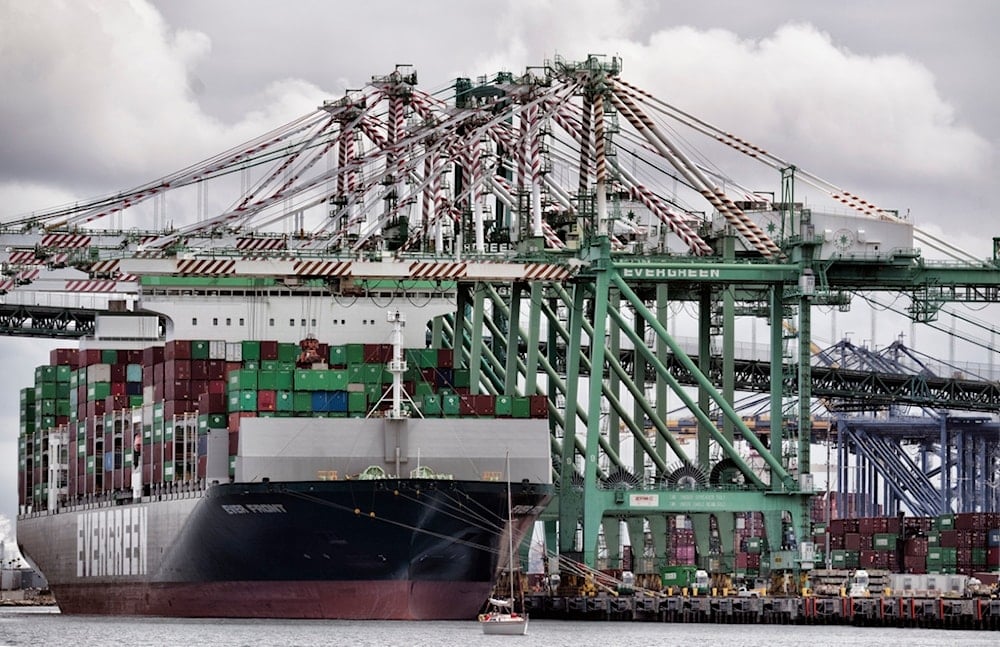US tariff hike on China may destabilize global economy: Jeffrey Sachs
With the newly imposed regulations, tariffs on steel and aluminum products from China are set to rise from 0-7.5% to 25% this year, and the tariff rate on Chinese-made semiconductors will double by 2025.
-

A sailboat passes a cargo ship unloading containers the port of Los Angeles in San Pedro on Thursday, June 15, 2023 (AP)
Renowned economist Jeffrey Sachs, President of the UN Sustainable Development Solutions Network, warned on Tuesday that the US government's decision to significantly raise tariffs on $18 billion worth of Chinese goods might have far-reaching consequences, potentially destabilizing the global economy and driving China closer to international trade alliances such as BRICS.
The White House announced earlier today its decision to increase tariffs on Chinese imports which include electric cars, solar panels, and steel, to shield local businesses from China's alleged unfair trade practices. In response, Beijing vowed to take all necessary measures to protect its interests.
"These steps are likely to undermine the global economy, divide the world increasingly into economic blocs, and heighten geopolitical tensions," Sachs told Sputnik in an interview. "China’s response will be to intensify its outreach to the BRICS, G77, and the Non-Aligned Movement."
Sachs suggested that China will likely speed up projects like the Belt and Road Initiative and the New Development Bank in response to the Biden administration's move.
Read more: US global standing plummeting in favor of China, Russia: Survey
With the newly imposed regulations, tariffs on steel and aluminum products from China are set to rise from 0-7.5% to 25% this year, and the tariff rate on Chinese-made semiconductors will double by 2025. Moreover, the tariff rate on electric vehicles from China is projected to increase from 25% to 100% within the same timeframe.
"All in all, this is further drift into heightened global tensions and uncertainty," Sachs said. "The policies will not give any significant boost to the US economy."
Sachs warned of the US's growing protectionism, suggesting a departure from global trade norms.
He attributed the US government's decision to increase tariffs on Chinese goods to three main factors: political considerations in swing states, efforts to reindustrialize after decades of offshoring, and attempts to hinder China's economic growth.
Sachs also anticipated that China would strive to maintain some degree of trade openness with the European Union (EU), although he observed a trend towards increased protectionism within the EU as well.
Meanwhile, the EU is closely monitoring the impact of US tariffs on the bloc's trade interests, as per an EU trade spokesperson.
Read more: Xi Jinping on a European tour amid EU trade dispute
Earlier today, the Financial Times published an op-ed suggesting that Russian President Vladimir Putin's upcoming visit to Beijing signals an important shift in perceptions of US economic threats.
Since February 2022, Beijing has become Russia's largest market for oil and gas, as well as a major source of imports. Alarmed by this partnership, the White House in December 2023 threatened sanctions on any bank facilitating payments for Russian military equipment.
US Treasury Secretary Janet Yellen and Secretary of State Antony Blinken made separate visits to China earlier this year, issuing warnings to Chinese leaders and financial institutions.
Despite these threats, both the Russian and Chinese governments have shown remarkable resilience. Putin's visit presents a new opportunity to discuss the creation of an alternative global financial market.

 3 Min Read
3 Min Read








